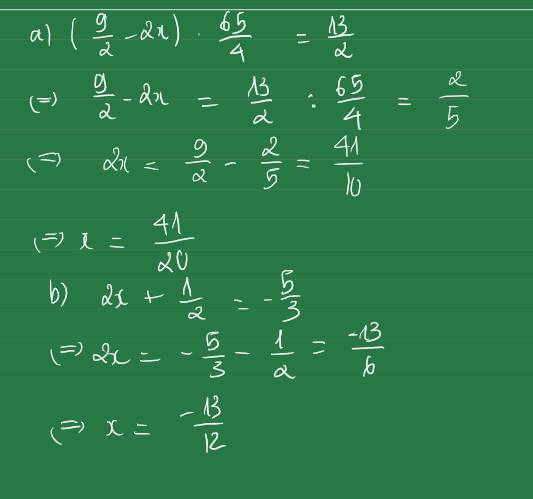
Hãy nhập câu hỏi của bạn vào đây, nếu là tài khoản VIP, bạn sẽ được ưu tiên trả lời.


1: =>x+1/2=0 hoặc 2/3-2x=0
=>x=-1/2 hoặc x=1/3
2: =>7/6x=5/2:3,75=2/3
=>x=2/3:7/6=2/3*6/7=12/21=4/7
3: =>2x-3=0 hoặc 6-2x=0
=>x=3 hoặc x=3/2
4: =>-5x-1-1/2x+1/3=3/2x-5/6
=>-11/2x-3/2x=-5/6-1/3+1
=>-7x=-1/6
=>x=1/42

\(\dfrac{5}{x}+1+\dfrac{4}{x}+1=\dfrac{3}{-13}\\ \Rightarrow\dfrac{9}{x}+2=-\dfrac{3}{13}\\ \Rightarrow\dfrac{9}{x}=-\dfrac{59}{13}\\ \Rightarrow x=-\dfrac{207}{59}\)
a. \(\dfrac{5}{x+1}+\dfrac{4}{x+1}=\dfrac{-3}{13}\)
ĐKXĐ: x ≠ -1
⇔ \(\dfrac{65}{13\left(x+1\right)}+\dfrac{52}{13\left(x+1\right)}=\dfrac{-3\left(x+1\right)}{13\left(x+1\right)}\)
⇔ 65 + 52 = -3(x + 1)
⇔ 117 = -3x - 3
⇔ 117 + 3 = -3x
⇔ 120 = -3x
⇔ x = \(\dfrac{120}{-3}=-40\) (TM)
b. -x + 2 + 2x + 3 + x + \(\dfrac{1}{4}\) + 2x + \(\dfrac{1}{6}\) = \(\dfrac{8}{3}\)
⇔ -x + 2x + x + 2x = \(\dfrac{8}{3}-\dfrac{1}{6}-\dfrac{1}{4}-3-2\)
⇔ 4x = -2,75
⇔ x = \(\dfrac{-2,75}{4}=\dfrac{-11}{16}\)
c. \(\dfrac{3}{2x+1}+\dfrac{10}{4x+2}-\dfrac{6}{6x+2}\) = \(\dfrac{12}{26}\)
⇔ \(\dfrac{3}{2x+1}+\dfrac{10}{2\left(2x+1\right)}-\dfrac{6}{2\left(3x+1\right)}=\dfrac{12}{26}\)
⇔ \(\dfrac{312\left(3x+1\right)}{104\left(2x+1\right)\left(3x+1\right)}\) + \(\dfrac{520\left(3x+1\right)}{104\left(2x+1\right)\left(3x+1\right)}\) - \(\dfrac{312\left(2x+1\right)}{104\left(2x+1\right)\left(3x+1\right)}\)
= \(\dfrac{48\left(2x+1\right)\left(3x+1\right)}{104\left(2x+1\right)\left(3x+1\right)}\)
⇔ 312(3x +1) + 520(3x + 1) - 312(2x + 1) = 48(2x + 1)(3x + 1)
⇔ 936x + 312 + 1560x + 520 - 624x - 312 = (96x + 48)(3x + 1)
⇔ 936x + 312 + 1560x + 520 - 624x - 312 = 288x2 + 96x + 144x + 48
⇔ 936x + 1560x - 624x - 96x - 144x - 288x2 = 48 - 312 - 520 + 312
⇔ 1632x - 288x2 = -472
⇔ -288x2 + 1632x + 472 = 0 (Tự giải tiếp, dùng phương pháp tách hạng tử)
⇔ x = 5,942459684 \(\approx\) 6


6x . 6 = 2016
6x = 2016 : 6
6x = 336
=> x \(\in\varnothing\)
42x+3 : 4 = 256
42x+3 = 256 x 4
42x+3 = 1024
42x+3 = 45
2x + 3 = 5
2x = 5 - 3
2x = 2
x = 2 : 2
x = 1
[ x - 2 ]2 = 16
[ x - 2 ]2 = 42
x - 2 = 4
x = 4 + 2
x = 6
[ 2x - 1 ]3 = 27
[ 2x - 1 ]3 = 33
2x - 1 = 3
2x = 3 + 1
2x = 4
x = 4 : 2
x = 2
[ 2x - 1 ]100 = [ 2x - 1 ]100
=> x \(\in N\)

\(\frac{1}{2.4}+\frac{1}{4.6}+...+\frac{1}{\left[\left(2x-2\right).2x\right]}=\frac{1}{8}\)
\(\Rightarrow\frac{1}{2}.\left(\frac{1}{2}-\frac{1}{4}+\frac{1}{4}-\frac{1}{6}+...+\frac{1}{2x-2}-\frac{1}{2x}\right)=\frac{1}{8}\)
\(\Rightarrow\frac{1}{2}.\left(\frac{1}{2}-\frac{1}{2x}\right)=\frac{1}{8}\)
\(\Rightarrow\frac{1}{2}-\frac{1}{2x}=\frac{1}{8}:\frac{1}{2}\)
\(\Rightarrow\frac{1}{2}-\frac{1}{2x}=\frac{1}{4}\)
\(\Rightarrow\frac{1}{2x}=\frac{1}{2}-\frac{1}{4}\)
\(\Rightarrow\frac{1}{2x}=\frac{1}{4}\)
\(\Rightarrow2x=4\)
\(\Rightarrow x=2\)

a) (2x - 3)(6 - 2x) = 0
=> \(\left[{}\begin{matrix}2x-3=0\\6-2x=0\end{matrix}\right.=>\left[{}\begin{matrix}2x=3\\2x=6\end{matrix}\right.=>\left[{}\begin{matrix}x=\dfrac{3}{2}\\x=3\end{matrix}\right.\)
b) \(5\dfrac{4}{7}:x=13=>\dfrac{39}{7}:x=13=>x=\dfrac{39}{7}:13=>x=\dfrac{3}{7}\)
c) \(2x-\dfrac{3}{7}=6\dfrac{2}{7}=>2x-\dfrac{3}{7}=\dfrac{44}{7}=>2x=\dfrac{47}{7}=>x=\dfrac{47}{14}\)
d) \(\dfrac{x}{5}+\dfrac{1}{2}=\dfrac{6}{10}=>\dfrac{x}{5}=\dfrac{6}{10}-\dfrac{1}{2}=>\dfrac{x}{5}=\dfrac{1}{10}=>x.10=5=>x=\dfrac{1}{2}\)
e) \(\dfrac{x+3}{15}=\dfrac{1}{3}=>\left(x+3\right).3=15=>x+3=5=>x=2\)

a. \(2\left(\dfrac{1}{2}x-\dfrac{1}{3}\right)-\dfrac{3}{2}=\dfrac{1}{4}\\ \Leftrightarrow2\left(\dfrac{1}{2}x-\dfrac{1}{3}\right)=\dfrac{7}{4}\\ \Leftrightarrow\dfrac{1}{2}x-\dfrac{1}{3}=\dfrac{7}{8}\\ \Leftrightarrow\dfrac{1}{2}x=\dfrac{29}{24}\\ \Leftrightarrow x=\dfrac{29}{12}\)
b. \(\dfrac{3}{4}-2\left(2x-\dfrac{2}{3}\right)=2\\ \Leftrightarrow2\left(2x-\dfrac{2}{3}\right)=-\dfrac{5}{4}\\ \Leftrightarrow2x-\dfrac{2}{3}=-\dfrac{5}{8}\\ \Leftrightarrow2x=\dfrac{1}{24}\\ \Leftrightarrow x=\dfrac{1}{48}\)
c. \(\left(2x-3\right)\left(6-2x\right)=0\\ \Rightarrow\left[{}\begin{matrix}2x-3=0\\6-2x=0\end{matrix}\right.\\ \Leftrightarrow\left[{}\begin{matrix}x=\dfrac{3}{2}\\x=3\end{matrix}\right.\)
Vậy ..........

`(2x+1)^4 = (2x+1)^6`
`<=> (2x+1)^4 - (2x+1)^6 = 0`
`<=>(2x+1)^4 - (2x+1)^4 . (2x+1)^2 = 0`
`(2x+1)^4 . [1-(2x+1)^2] = 0`
`@Th1:`
`(2x+1)^4 =0`
`2x+1=0`
`2x=0-1`
`2x=-1`
`x=-1:2`
`x=-1/2`
`@Th2:`
`1-(2x+1)^2=0`
`(2x+1)^2 =1-0`
`(2x+1)^2 = 1`
`(2x+1)^2 = 1^2`
`2x+1=1`
`2x=1-1`
`2x=0`
`x=0:2`
`x=0`
Vậy `x = {-1/2 ; 0}`
(2x+1)4 = (2x+1)6
(2x +1)6 - (2x+1)4 = 0
(2x+1)4 .{ (2x+1)2 - 1} = 0
2x + 1 = 0 ⇒ x = -1/2
(2x + 1)2 = 1
2x + 1 = +- 1
x = 0; -1
x ϵ { -1;-1/2;0}